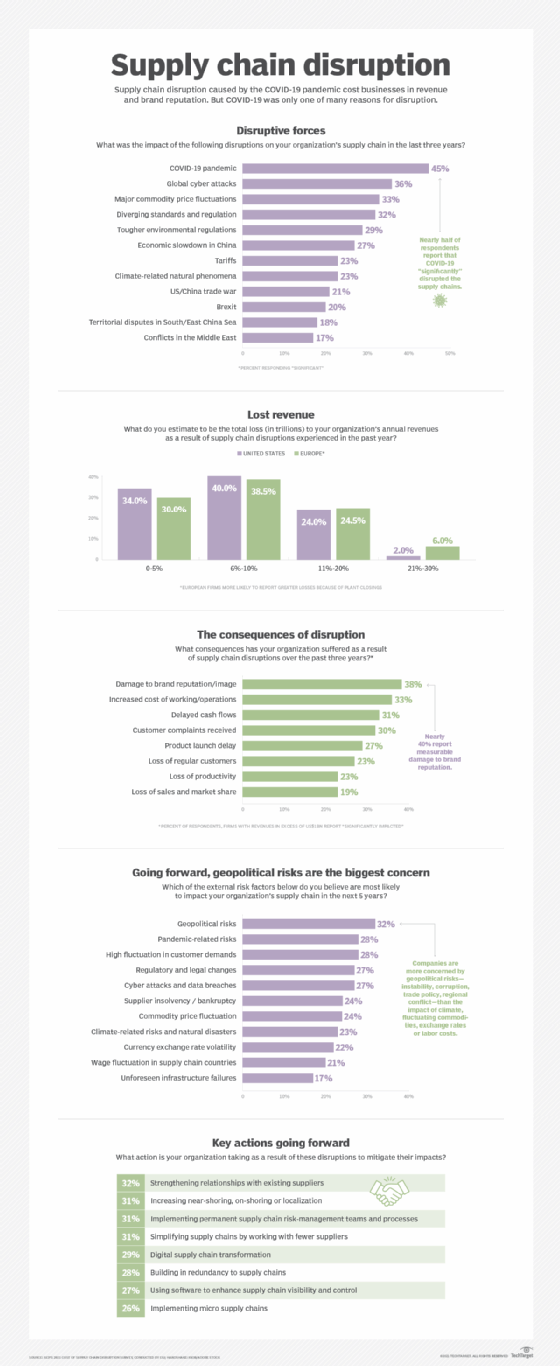
Getty Images
Growing number of risks tests supply chain continuity
In this Q&A, supply chain expert Zachary Collier looks at some ways supply chains are threatened today and how companies need to avoid a single point of failure in supply chains.
Supply chains now face risks on several fronts, including complications brought on by the COVID-19 pandemic as well as events companies can better plan for, such as the growing threat of counterfeits.
These risks can create supply chain continuity vulnerabilities that result in the shortage of critical components like computer microchips, for example, which hampered the automobile manufacturing industry and threatened national security. Although there are signs that the chip crisis might be easing, the shortages highlighted the risks of sourcing critical components from vulnerable areas.
Supply chain expert Zachary Collier, assistant professor of management at Radford University and president of Collier Research Systems, identifies some of the supply chain security risks that companies face today and discusses why a single point of failure in a company's supply chain can quickly become its downfall. In this environment, implementing a risk management strategy is essential.
What are some of the main supply chain risks that companies need to pay attention to now?
Zachary Collier: The main risks are disruptions in your supply chain from natural disasters or man-made disasters. Droughts, for instance, can lead to issues. For example, a drought happened recently in Taiwan that affected the chipmaking capabilities there. Making microchips is a water-intensive process, and they had to truck in water from other places to make sure that the facilities could operate.
 Zachary Collier
Zachary Collier
Another thing is the integrity of the products themselves, like counterfeiting. If you have a big, global and fragmented supply chain, there are a lot of opportunities for counterfeit or adulterated parts or products to secretly enter into your supply chain. So how do you track and trace and authenticate that the products are actually good?
There are also supply chain risks with the security of third-party vendors. If somebody is trying to hack into your systems, they try to find the weak link in the chain. That's what happened with the Target data security breach of a couple years ago, when somebody was able to gain unauthorized access through their air conditioning vendors.
What effect has the COVID-19 pandemic had on supply chain risks?
Collier: The pandemic had visible and noticeable effects on different types of products. For example, with everybody working from home, demand increased for new laptops and other electronics so that people could work from home. That put pressure on chipmakers, which had a ripple effect that hit the auto industry particularly hard. Cars are increasingly including digitized features, like internet connectivity and other electronics that go into a modern-day vehicle. So they had to shut down production lines because of the pandemic.

Are there recent events that have caused more supply chain risks?
Collier: One is the war in Ukraine. Ukraine produces roughly half of the world's neon gas, which is a very important commodity used in chip manufacturing. So disruption in that supply chain obviously has a ripple effect downstream. Places are even having trouble sourcing birdseed, because Ukraine supplies a lot of the world's sunflower seeds. So geopolitical tensions can have all sorts of unintended ripple effects on all kinds of sectors of the economy.
Are there national security implications for issues like the disruption to chip manufacturing?
Collier: The Department of Defense needs chips as much as anybody else to perform certain missions, and there are accreditations that you can get to become a 'trusted supplier' of chips. Security is quite important in these applications, and you need to have a chain of custody for the chips used in them. You need to know where these chips have been before they go into mission-critical defense systems -- as well as for the nation's critical infrastructure, such as the electric grids, or the financial and healthcare infrastructure. These things need to work when they're supposed to work.
One criterion for security is integrity -- that a chip does what it's supposed to do and doesn't do what it's not supposed to do. So, having chips of unknown origin runs the risks of anything from quality degradation to malicious tampering that could provide a backdoor into your system. These issues become even more important with the more national defense-related applications the chips are used in, so it's all the more important to establish a trusted end-to-end supply chain for these critical components.
What are the risks in relying on a vulnerable source like Taiwan for chip production?
Collier: Taiwan makes about half of the world's chips, so, given the tensions between Taiwan and China, there's a very real worry that there would be a huge disruption in the supply chain if something should happen to Taiwan. This gets back to the basic risk management theory -- that if you have a big system, there's a big risk in having a single point of failure. You want to build in redundancy and resilience so you can bounce back from that. The more capacity that's in the U.S. or other friendly nations lessens the impact should one of the big players in the supply chain suffer a disruption, whether it's a geopolitical thing or [natural disaster]. You want to build those contingencies into the supply chain and into your procurement strategy.
Companies have to consider supply chain risks, but do these risks need to be addressed from an industry or nationwide level?
Collier: We have to think about it from the industry and national level, and what the government can do to strengthen the position of important industries that the other sectors of the economy rely on. They've been talking about measures like onshoring domestic capacity of things that have gone overseas and have led to vulnerabilities. There are different levels of analysis, and they all have to work in tandem.
Is bringing chip capacity back to the U.S. the answer to the chip supply chain problems?
Collier: The EU is similarly looking to build capacity, and there might be a silver lining that people are waking up to the importance of the microelectronics supply chain. The pandemic and the shortages brought these issues to the forefront more than they were before, and countries all over the world are investing in their domestic capacities. There are new factories that are starting to be built here in the U.S., but it will take some time. But better now than never, and the sooner we can get a more robust and resilient supply chain, the better.
Jim O'Donnell is a TechTarget senior news writer who covers ERP and other enterprise applications for SearchSAP and SearchERP.







